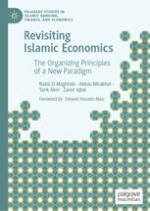This book discusses the need for a paradigm shift from Islamic economics universe of discourse to Iqtisād, a socio-economic system that is entirely independent from other economic doctrines and systems of thought. It provides an overview of critiques of the science and dogma of mainstream, orthodox, neoclassical, or simply Economics, with its axioms of rationality, scarcity, and unlimited wants. There is also a critical analysis of Islamic economics, and its failures to set its own policy agenda and development objectives. Our contention in this book is that Iqtisād--the Qur’an’s vision of how the economy is to be arranged—provides such a paradigm with a radically different philosophical foundation from that of Economics to the point that makes grafting one onto the other Impossible.
Iqtisād offers a genuine and authentic Islamic paradigm with unique etymological and philosophical foundations. It is a unique system that derives its organizing principles from the principal source of the Quran, rather than Economics. The logical coherence of its immutable system of rules compliance, institutional structures, and risk-sharing relations provides the foundations for economic dynamism, financial stability, and shared prosperity. It ensures that resources are efficiently managed, poverty is eradicated, income and wealth mal-distributions are corrected, and the internal sources of economic injustices gripping human societies are eliminated.
The Impossibility Theorem proposed in this book implies that, metaphysically, ontologically, epistemologically, axiologically, and teleologically, the two polar cases of Iqtisād and Economics are so radically different to rule out any grafting of one onto the other in order to present an intermediate paradigm with a synthetic discipline called Islamic economics. Given its multidisciplinary contents, this book will be of interest to a wide audience, including economists, policymakers, philosophers, theologians, and jurists, and can guide also free-thinking readers to a clarity of understanding about the conditions of humanity and the imperative of change with a sincerity of purpose and coherence in knowledge.
